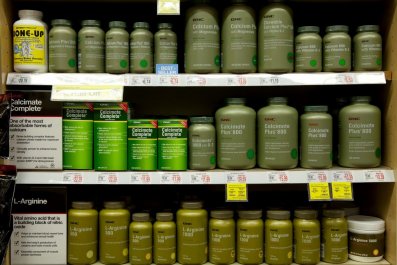Talk about a bitter pill: Vitamins might not do anything to prevent cancer or cardiovascular disease. According to a new report from the U.S. Preventive Services Task Force, there's not enough evidence to suggest that single or paired-nutrient supplements curtail the development of those maladies.
"The [task force] found inadequate evidence on the benefits of supplementation with individual vitamins, minerals, or functional pairs in he
althy populations without nutritional deficiencies to reduce the risk of cardiovascular disease or cancer," the draft recommendation states. (The evidence supporting this report was published in the Annals of Internal Medicine.)
Dr. Michael LeFevre, panel co-chair and medicine professor at University of Missouri, tells Newsweek: "There are a lot of people out there who are taking either individual supplements or multivitamins in hopes that they will prevent cancer and heart disease.... We cannot conclude that you can take a pill and do the same thing as eating well accomplishes."
He adds that vitamin E doesn't to prevent either condition and that the beta carotene "may actually be harmful." The report notes that "supplementation with beta carotene increases the risk of lung cancer in persons who are at increased risk of lung cancer." The comprehensive study updates the task force's 2003 recommendations, which are meant to be used as treatment guidelines for primary care physicians.
This might come as bad news to the 50 percent of American adults who take vitamins and minerals and reportedly spend $28.1 billion annually on supplements. Though most of the medical establishment has long been skeptical of the alleged special powers of supplements, many Americans believe some vitamins and minerals have curative or preventive properties. And though supplement companies are careful to never say directly say their products will cure or prevent diseases, product marketing often hints at these properties, such as GNC's "Preventive Nutrition" line.
Dr. Paul Offit, chief of the Division of Infectious Diseases and the director of the Vaccine Education Center at the Children's Hospital of Philadelphia, has written extensive critiques of supplements and alternative medicine. He tells Newsweek that "most people get what they need in the foods that they eat."
Offit hopes this report will encourage consumers to think twice before downing doses of these items - the same way they would seek a second opinion before consenting to surgery. "You should really question whether you should be taking a supplement," he said. "Why aren't we as suspicious of this industry as we are of conventional medicine? Just bring the same level of skepticism to one as the other."
The Council for Responsible Nutrition, a supplement industry trade group, says in a statement that "the paucity of clinical trial evidence should not be misinterpreted as a lack of benefit for the multivitamin."
The council calls for a holistic approach, saying "nutrients work in synergy with other nutrients.... We should consider vitamins a piece of the health puzzle, not magic bullets that are the be-all and end-all for preventing serious diseases like cancer and cardiovascular disease. If there are benefits for vitamins for cancer and cardiovascular disease, those benefits are icing on the cake."
LeFevre suggests that anyone interested in proven preventive nutrition skip both the icing and the cake. "My mother was probably right when she told me to eat my vegetables," he says.























